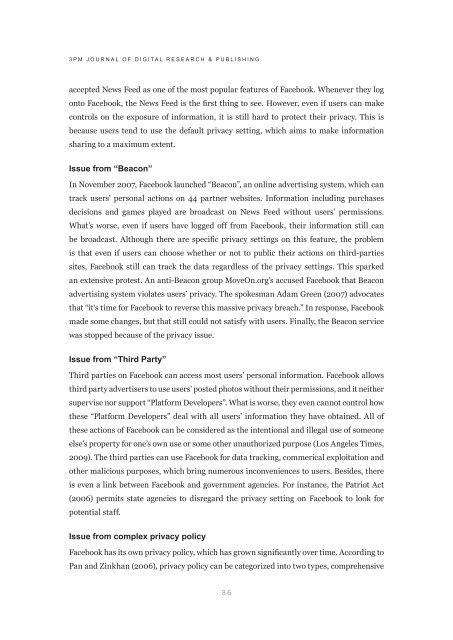3pm Journal of Digital research & publishing - artichoke web design
3pm Journal of Digital research & publishing - artichoke web design
3pm Journal of Digital research & publishing - artichoke web design
You also want an ePaper? Increase the reach of your titles
YUMPU automatically turns print PDFs into web optimized ePapers that Google loves.
<strong>3pm</strong> <strong>Journal</strong> <strong>of</strong> <strong>Digital</strong> <strong>research</strong> & <strong>publishing</strong><br />
accepted News Feed as one <strong>of</strong> the most popular features <strong>of</strong> Facebook. Whenever they log<br />
onto Facebook, the News Feed is the first thing to see. However, even if users can make<br />
controls on the exposure <strong>of</strong> information, it is still hard to protect their privacy. This is<br />
because users tend to use the default privacy setting, which aims to make information<br />
sharing to a maximum extent.<br />
Issue from “Beacon”<br />
In November 2007, Facebook launched “Beacon”, an online advertising system, which can<br />
track users’ personal actions on 44 partner <strong>web</strong>sites. Information including purchases<br />
decisions and games played are broadcast on News Feed without users’ permissions.<br />
What’s worse, even if users have logged <strong>of</strong>f from Facebook, their information still can<br />
be broadcast. Although there are specific privacy settings on this feature, the problem<br />
is that even if users can choose whether or not to public their actions on third-parties<br />
sites, Facebook still can track the data regardless <strong>of</strong> the privacy settings. This sparked<br />
an extensive protest. An anti-Beacon group MoveOn.org’s accused Facebook that Beacon<br />
advertising system violates users’ privacy. The spokesman Adam Green (2007) advocates<br />
that “it‘s time for Facebook to reverse this massive privacy breach.” In response, Facebook<br />
made some changes, but that still could not satisfy with users. Finally, the Beacon service<br />
was stopped because <strong>of</strong> the privacy issue.<br />
Issue from “Third Party”<br />
Third parties on Facebook can access most users’ personal information. Facebook allows<br />
third party advertisers to use users’ posted photos without their permissions, and it neither<br />
supervise nor support “Platform Developers”. What is worse, they even cannot control how<br />
these “Platform Developers” deal with all users’ information they have obtained. All <strong>of</strong><br />
these actions <strong>of</strong> Facebook can be considered as the intentional and illegal use <strong>of</strong> someone<br />
else’s property for one’s own use or some other unauthorized purpose (Los Angeles Times,<br />
2009). The third parties can use Facebook for data tracking, commerical exploitation and<br />
other malicious purposes, which bring numerous inconveniences to users. Besides, there<br />
is even a link between Facebook and government agencies. For instance, the Patriot Act<br />
(2006) permits state agencies to disregard the privacy setting on Facebook to look for<br />
potential staff.<br />
Issue from complex privacy policy<br />
Facebook has its own privacy policy, which has grown significantly over time. According to<br />
Pan and Zinkhan (2006), privacy policy can be categorized into two types, comprehensive<br />
86


